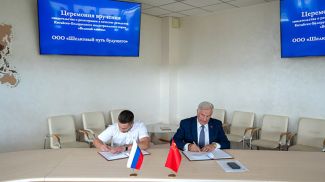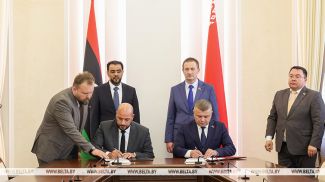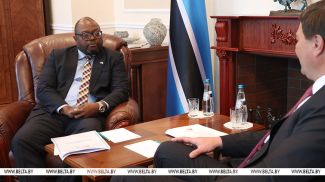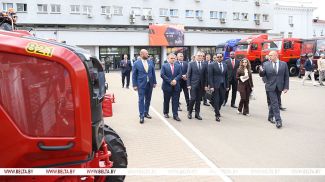MINSK, 25 May (BelTA) – Belarusian First Deputy Prime Minister Nikolai Snopkov spoke about new transport and logistics chains amid sanctions at a joint meeting of the House of Represnetatives and the Council of the Republic of the National Assembly of Belarus on 25 May, BelTA has learned.
“For exports it is extremely important to build new transport and logistics chains. After 24 February the sanctions pressure intensified on all modes of transport. Road transportation in the Ukrainian direction was completely stopped. On 8 April the European Union introduced a ban for Belarusian and Russian companies on the transportation of goods within the European Union, including transit. As a result, road freight services decreased by 9% over the past four months. About 30% of the car fleet was not used. In order to level out the situation and support the domestic road carriers, retaliatory measures were taken: the movement of European vehicles through our territory was banned,” said Nikolai Snopkov.
In order to keep logistics and work of our road carriers, 24 special buffer zones were set up for transshipment of EU freight onto domestic vehicles in both directions. “If in the first months of the year there were 100-200 vehicles, in May the daily figure rose to 800 on average. We are simultaneously negotiating with friendly countries to increase the number of permits for cargo transportation - these are Armenia, Kyrgyzstan, Kazakhstan, Azerbaijan, Georgia, Uzbekistan, Turkey, Turkmenistan, Tajikistan, Russia, and China. We have resumed negotiations with Russia to cancel permits and perform cabotage transportation on its territory. It has already been agreed with China to let our vehicles on their territory,” the first deputy prime minister said.
Railway transport is operating today under conditions of a complete cessation of transportation in communication with Ukraine. “Last year about 12 million tonnes of cargo were transported by rail, or 9% of the total transportation by rail. 45% of the volume is oil and oil products. The rest includes chemical and mineral fertilizers, coal, construction cargo, ferrous metals, timber and so on. During the same period 16 million tonnes of cargo were transported in the Lithuanian direction. The main share is potassium. The rest is construction materials, wood products and metals. On 17 May Lithuanian Railways notified Belarusian Railways on the termination of transportation of the goods under sanction - timber products, rubber products, ferrous metals - from 4 June. The last trains with such products will be received from Belarusian Railways on 31May. In other words, only goods not subject to sanctions will continue to go in this direction. The total losses in these two directions amount to 26 million tonnes of cargo,” Nikolai Snopkov said.
To compensate for these losses, we increased container transportation to China and transit - by 11%. “Secondly, given the increased shipment distance and
an insufficient number of railcars, the government drafted a decree to purchase railcars from Mogilev Carriage Works and Osipovichi Transport Engineering Plant to compensate for the increased demand for them. Thirdly, in order to resolve logistical constraints in the long term, the head of state made a strategic decision to build a port in Russia. All these measures help us adjust to a new working environment and restore the results of past periods,” Nikolai Snopkov said.
The EU countries have banned Belarus from using their airspace. They have been joined by some of our EAEU partners. “The airspace of Ukraine has been closed. Most foreign air carriers have left our market. Three out of ten carriers remained – these are Belavia, Uzbekistan Airways and Aeroflot. The EU fleet flies bypassing Belarus which affects the work of Belaeronavigatsia. Twice as few flights have been serviced over the past four months. Our aviation in such conditions flies on modified routes, which, unfortunately, increases the time and distance of flights. In addition to the increased cost, it caused a shortage of aircraft. Last year Belavia's fleet consisted of 29 aircraft, including 18 on lease. Since the EU sanctions provided for the termination of leasing contracts, 15 aircraft were returned to the lessors. Three aircraft were fully paid and bought back thanks to the prompt decision of the president,” the first deputy prime minister said.
At the moment the whole fleet is loaded and fully supports the entire summer program of Belavia. Flights are operated to 16 airports in eight countries. “The measures taken over the past three months have helped increase the export of passenger transport services to Georgia by almost 5 times, to Israel by 2.5 times, to Cyprus by 30%, to Russia and Turkey by 46% and 43% respectively,” said Nikolai Snopkov.













